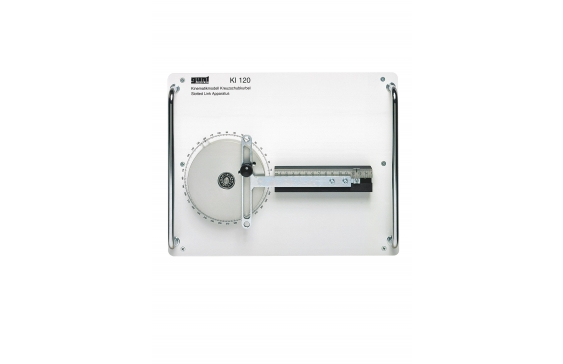KI 120 Kinematic model: crank slider

The crank slider, unlike a normal crank mechanism, generates a purely harmonic stroke movement.
The KI 120 unit can be used to generate and study purely harmonic stroke movements. The experimental unit comprises a rotating crank disk, connecting rod and fixed cylinder. The connecting rod is connected to the crank disk on one side via a crank. Changing the position of the crank on the crank disk adjusts the crank radius in three positions.
At the other end, the connecting rod is connected to the fixed cylinder. This end models the piston. The angle is adjusted using the crank disk, and an angle scale is integrated into the base plate. A millimetre-precise steel ruler is attached to the cylinder to measure the stroke.
The elements are mounted on a base plate. Two handles make it easy to carry and stack the unit.
- representation of a purely harmonic reciprocating motion
Crank disk
- anodised aluminium
- ball-bearing mounted
Crank radius
- 25mm
- 37,5mm
- 50mm
Connecting rod
- anodised aluminium
Cylinder
- stroke 0…100mm
- investigation of a crank slider
- generation and investigation of purely harmonic stroke movements
- adjustment of the crank radius at three positions of the connecting rod on the crank disk
- adjustment of the angle by turning the crank disk
- measure the stroke on the cylinder
- conversion of a uniform rotary motion into a purely harmonic reciprocating motion
- influence of crank length and input angle on the output stroke
- recording the transmission function of a crank slider
